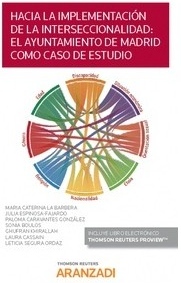Lecturas sobre interseccionalidad

Esta semana os recomendamos dos lecturas de autoras del grupo GEYPO que adoptan un enfoque de interseccionalidad al análisis de la política. La primera es el libro escrito por La Barbera, MariaCaterina, Julia Espinosa-Fajardo, Paloma Caravantes González, Sonia Boulos, Ghufran KhirAllah, Laura Cassain & Leticia Segura Ordaz (2020). Hacia la implementación de la interseccionalidad: El Ayuntamiento de Madrid como caso de estudio [Towards the implementation of intersectionality: Madrid City Council as a case study]. Madrid: Aranzadi. Esta monografía explora los retos y ventanas de oportunidad para incorporar la interseccionalidad en las políticas municipales, la práctica administrativa y los instrumentos legales del Ayuntamiento de Madrid. El objetivo es avanzar recomendaciones para mejorar la implementación de la interseccionalidad y abordar las situaciones de vulnerabilidad y discriminación múltiple.
La segunda lectura recomendada de esta semana es el artículo de Rubio Grundell, Lucrecia (2021) The Rise of Neo-Abolitionism in Europe: Exploring the role of the Neoliberalism-Vulnerability-Security Nexus in the Prostitution Policies of the UK, Spain, France and Ireland. Social politics. Open access, DOI: https://doi.org/10.1093/sp/jxab018
This article explains the rise of neo-abolitionism in Europe with reference to the intersection that it enables between the gender and sexual politics of neoliberalism, vulnerability, and security. Analyzing the recent adoption of neo-abolitionist prostitution policies in the United Kingdom, Spain, France, and Ireland, it contends that neo-abolitionism offers a suitable response to the needs that globalized neoliberalism creates for European states, allowing them to extend their control, disguise their moral agenda, and reproduce their material and normative foundations, guaranteeing the reproduction of the population and accumulation of wealth while reasserting their sovereignty and political identity as progressive in gender and sexual terms.
¡Buenas lecturas interseccionales!